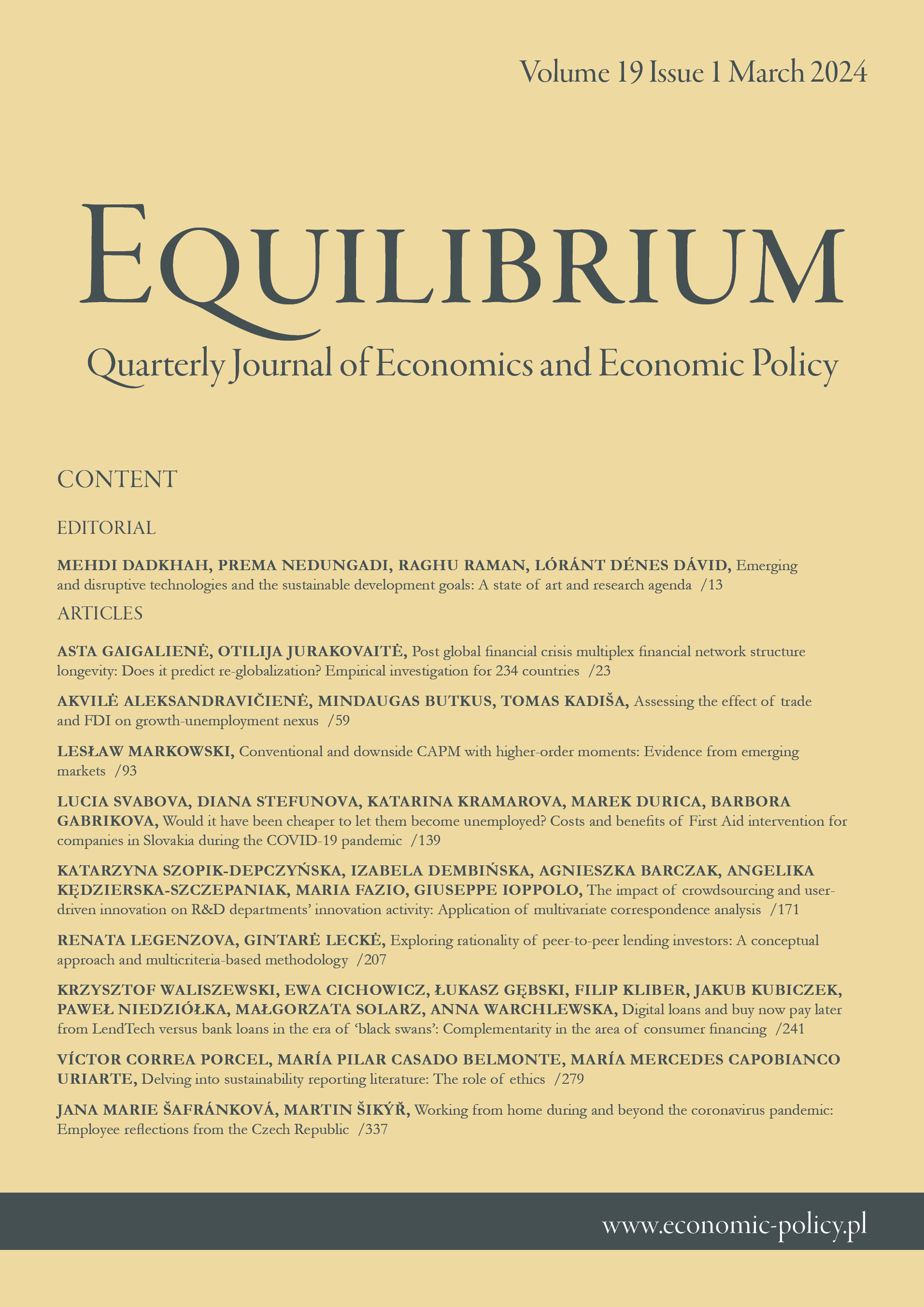A Misinterpretation of Keynes's Concept of Involuntary Unemployment
IF 6.2
Q1 ECONOMICS
Equilibrium-Quarterly Journal of Economics and Economic Policy
Pub Date : 2018-06-30
DOI:10.24136/EQ.2018.017
引用次数: 0
Abstract
Research background: One of the principal contributions of Maynard Keynes’s General Theory was identification of the phenomenon of involuntary unemployment, due (on account of adverse expectations and confidence on the part of potential buyers) to a want of demand for the quantity of output which a fully-employed labour force was capable of producing. Such unemployment, he insisted — contrary to conventional opinion — was not due to workers pricing themselves out of work by demanding wages higher than employers could afford. Far from unemployed workers being themselves responsible for their plight, they were, in reality, victims of circumstances beyond their control. Keynes’s understanding was, for many years, widely accepted by academics, policy-makers and the general public. In recent times, however, mainstream macroeconomic theory has shown a regrettable tendency to return to old modes of thinking. Blame for unemployment is again put on the workforce, whose alleged misunderstanding or slow response to change are said to imply seeking employment on unrealistic terms. A more extreme view is that worklessness may reflect a deliberate choice of leisure. To anyone sceptical of the validity of such analyses there is a clear need to recover the Keynesian understanding of the possibility not just of frictional or voluntary, but also of involuntary unemployment. Purpose of the article: Ezra Davar, recognising that it is important not to lose sight of the idea of involuntary unemployment, has recently attempted in this Journal to explain Keynes’s concept. Unfortunately, however, he fails to recognise that Keynes accounted for involuntary unemployment as resulting from deficiency of aggregate demand for output, not as the consequence of any supply-side factor. In attributing involuntary unemployment to a peculiarity in the labour supply function Davar quite misses Keynes’s point, and in fact identifies as involuntary unemployment a situation of what Keynes would have described as “voluntary” employment. The objective of the present note is to clear up this misunderstanding.对凯恩斯非自愿失业概念的误解
研究背景:梅纳德·凯恩斯的一般理论的主要贡献之一是发现了非自愿失业现象,这是由于(由于潜在买家的不利预期和信心)对充分就业的劳动力能够生产的产出数量缺乏需求。他坚持认为,与传统观点相反,这种失业并不是因为工人要求高于雇主负担得起的工资来定价失业。失业工人非但没有为自己的困境负责,事实上,他们是无法控制的环境的受害者。多年来,凯恩斯的理解被学术界、决策者和公众广泛接受。然而,近年来,主流宏观经济理论出现了令人遗憾的回归旧思维模式的趋势。失业的责任再次归咎于劳动力,据说他们对变革的误解或反应迟缓意味着以不切实际的条件寻求就业。一种更极端的观点是,无业可能反映了对休闲的刻意选择。对于任何对这些分析的有效性持怀疑态度的人来说,显然需要恢复凯恩斯主义对摩擦或自愿失业以及非自愿失业可能性的理解。文章的目的:埃兹拉·达瓦尔认识到不要忽视非自愿失业的概念很重要,他最近试图在《华尔街日报》上解释凯恩斯的概念。然而,不幸的是,他没有认识到凯恩斯将非自愿失业解释为产出总需求不足,而不是任何供应方因素的结果。达瓦尔将非自愿失业归因于劳动力供应函数的一个特殊性,这完全没有抓住凯恩斯的观点,事实上,他将凯恩斯所说的“自愿”就业情况认定为非自愿失业。本说明的目的是澄清这种误解。
本文章由计算机程序翻译,如有差异,请以英文原文为准。
求助全文
约1分钟内获得全文
求助全文
来源期刊
CiteScore
9.20
自引率
3.50%
发文量
28
审稿时长
36 weeks
期刊介绍:
Equilibrium. Quarterly Journal of Economics and Economic Policy is a scientific journal dedicated to economics, which is the result of close cooperation between the Instytut Badań Gospodarczych/Institute of Economic Research (Poland) and Polish Economic Society and leading European universities. The journal constitutes a platform for exchange of views of the scientific community, as well as reflects the current status and trends of world science and economy.
The journal especially welcome empirical articles making use of quantitative methods in: Macroeconomics and Monetary Economics, International Economics, Financial Economics and Banking, Public Economics, Business Economics, Labor and Demographic Economics, Economic Development, and Technological Change, and Growth.
Current most preferable topics and special issues:
The economics of artificial intelligence: business potentials and risks;
Digitalization and entrepreneurship in economics;
Sustainable socio-economic development, environmental and ecological economics;
Transition in the energy market (improving energy efficiency, alternative energy sources, renewable energy, energy security).

 求助内容:
求助内容: 应助结果提醒方式:
应助结果提醒方式:


